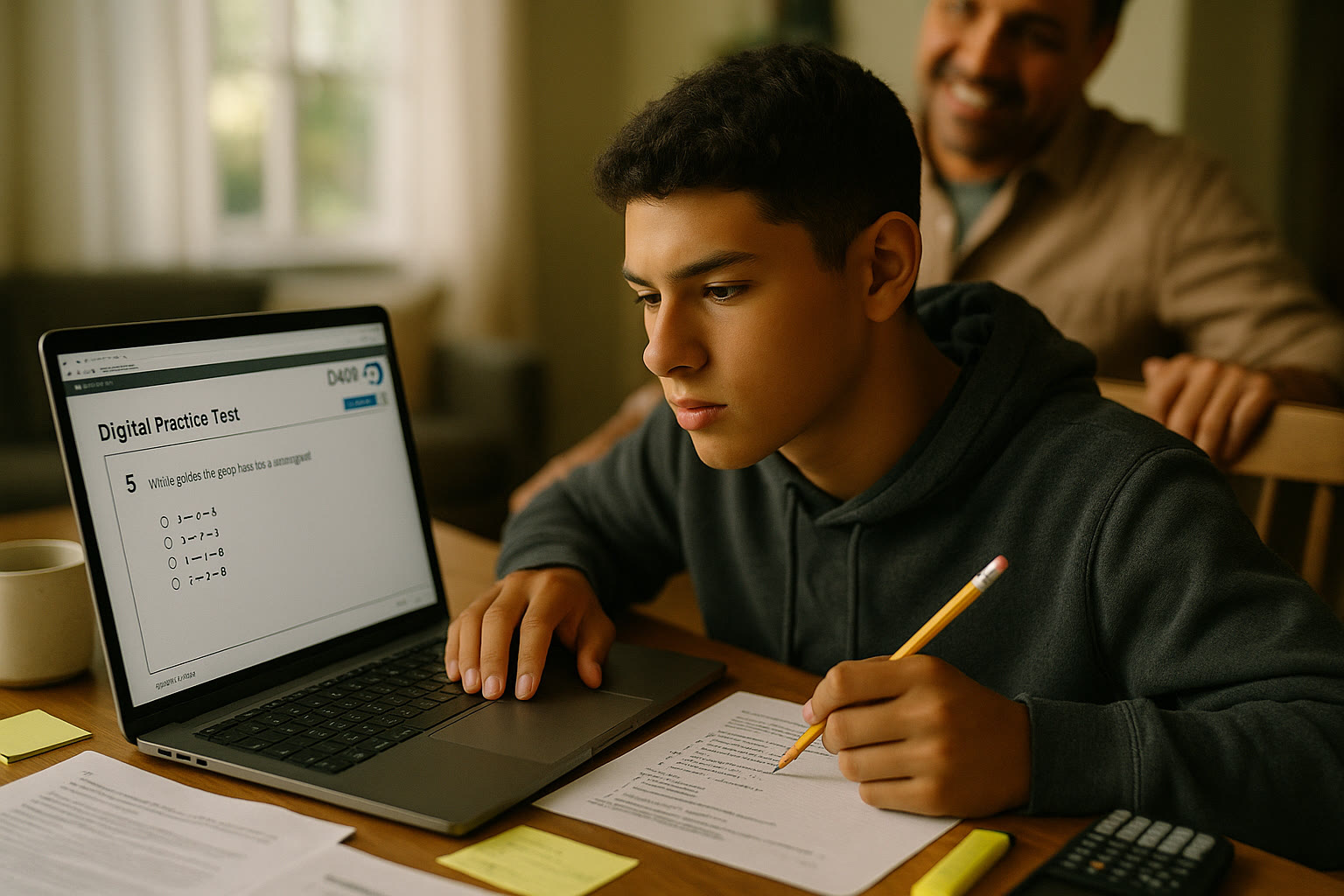Why Accountability Matters: More Than Just a Score
Parents often see the SAT as a single high‑stakes event and worry about scores, deadlines, and scholarship eligibility. But for teens, the SAT is also a lesson in responsibility—time management, resilience, and goal setting—skills that matter long after test day. Teaching accountability isn’t about pressure or perfection; it’s about helping your teen own the process, learn from setbacks, and celebrate progress.

Start With a Conversation: Align on Why
Begin by asking open, nonjudgmental questions: What colleges or majors excite you? What would a target SAT score unlock—scholarships, honor programs, or simply peace of mind? Understanding the personal “why” turns abstract goals into motivating reasons a teen wants to work toward them.
This conversation should be collaborative. Teens respond better when they feel heard and when goals feel self‑chosen. Offer context—typical score ranges for their dream schools, how a score affects scholarships—but avoid turning the chat into a lecture.
Practical prompts to guide the talk
- What would you like to be able to do because of your SAT results?
- How much time do you realistically have to practice each week?
- What parts of the test feel most intimidating or confusing?
- How would you like me to support you—coach, cheerleader, accountability partner, or something else?
Set Clear, Achievable Goals—and Break Them Down
Ambitious goals are great; vague ones are not. Help your teen set a specific target: a composite score or section targets (e.g., +40 points in Math). Then reverse‑engineer the plan into weekly actions. Small wins build momentum—weekly practice sessions completed, a set number of practice questions, or mastering a particular algebra concept.
Example: Turning a big goal into micro‑steps
Goal: Improve 60 points in Math over three months.
- Month 1: Diagnostic practice + focus on algebra review (3 practice sets per week).
- Month 2: Targeted problem solving + timed sections (4 practice sets per week).
- Month 3: Full‑length digital practice tests under Bluebook‑like conditions (one per week) + review sessions.
Design a Family Accountability System That Respects Autonomy
Accountability systems should encourage ownership, not resentment. Co‑create the structure: decide together what tasks matter most, how progress will be tracked, and what happens when targets are met or missed. Concrete, consistent check‑ins are far more effective than sporadic nagging.
Simple structures that work
- Weekly 20‑minute check‑ins: focus on what was learned, what was hard, and next steps.
- Shared visible tracker: a whiteboard, spreadsheet, or calendar showing practice sessions completed.
- Natural consequences: earn or lose privileges based on consistent effort, not on single test outcomes.
Tools and Routines: Habits That Make Accountability Simple
Good routines reduce decision fatigue. Help your teen choose two or three reliable study windows each week and protect that time. Make practice feel purposeful by mixing timed sections, targeted skills work, and full test simulations.
Recommended weekly routine (example)
- Monday: 45 minutes — targeted skill practice (e.g., grammar rules or algebra topics).
- Wednesday: 60 minutes — mixed problem sets under timed conditions.
- Saturday: 2 hours — full digital section practice or a scaled‑down full test.
Use Data to Guide Effort—Without Obsessing Over It
Diagnostic tests and frequent practice provide objective feedback about where time is best spent. Instead of focusing solely on score, look at patterns: Which question types are consistently missed? Is timing the main issue? This approach turns metrics into a learning map and keeps morale high because progress is visible.
| Performance Indicator | What It Reveals | Action |
|---|---|---|
| Percent correct by content area | Strengths and weaknesses by topic | Targeted lessons on weak topics |
| Average time per question | Timing pressure or reading speed issues | Timed drills and pacing strategies |
| Score improvement trend | Overall effectiveness of study plan | Adjust intensity or change tactics |
Celebrate Process, Not Just Results
When parents praise effort—consistency, strategy, and resilience—teens internalize habits more deeply than when praise focuses only on test scores. Celebrate milestones like completing a month of targeted practice, mastering a tricky concept, or completing a realistic full‑length digital simulation that mimics the Bluebook test day experience.
Practical Communication Tips for Parents
The way you talk about the SAT matters. A calm, curious tone invites collaboration; a high‑anxiety or punitive tone fosters avoidance. Here are phrases that help, and ones to avoid.
Helpful phrases
- “What part of prep felt useful this week?”
- “I noticed you did X—how can I help you keep that up?”
- “Let’s figure out one small change for next week and test it.”
Phrases to avoid
- “If you don’t get a [score], you won’t get into…” (pressure can backfire)
- “You should just study harder.” (vague and unhelpful)
- “I’ll do it for you.” (robs teens of ownership)
When to Step In—and When to Step Back
Parents should be ready to step in when motivation wanes, burnout appears, or logistics become a barrier. Practical support—arranging tutoring, providing quiet study space, or helping with registration—goes a long way. But step back when your teen needs to try strategies, make mistakes, and learn from them.
For families considering additional support, personalized tutoring that offers 1‑on‑1 guidance and tailored study plans can be a smart move—especially when it fits the teen’s learning style and schedule. Services that combine expert tutors with AI‑driven insights can help focus time on the areas that yield the biggest score gains, while keeping the teen accountable but not overwhelmed.
Designing Rewards and Consequences that Teach Responsibility
Rewards and consequences should be proportionate and related to the behavior, not the score. A teen who consistently completes practice could earn a one‑time reward (movie night, small purchase) or longer privileges (extra weekend time with friends). Conversely, if agreed‑upon study commitments aren’t met, logical consequences—like shifting a planned outing—can reinforce responsibility.
Modeling the Right Mindset: What Parents Can Demonstrate
Your teen watches how you handle setbacks. Model calm problem solving: when plans get disrupted, show how you reassess priorities and adjust. Share short personal stories of preparation—how you or someone you know prepared for an exam or big event—and emphasize the habits that helped more than the result itself.
Common Roadblocks and How to Overcome Them
Every teen faces obstacles. Below are common issues with realistic fixes.
Procrastination
- Fix: Break tasks into tiny steps (15–25 minutes). Use a timer and a short reward after each session.
Test anxiety
- Fix: Practice under realistic conditions, teach breathing and visualization techniques, and reframe mistakes as data about what to practice next.
Unclear study plan
- Fix: Use a diagnostic, track mistakes, and build weekly plans that rotate between skill practice, mixed problem sessions, and full digital simulations.
How to Use Practice Tests Effectively
Practice tests are gold—but only if review follows. Schedule full digital practice tests under timed conditions every 1–3 weeks depending on prep time. After each test, spend twice as long reviewing: categorize mistakes, annotate patterns, and create micro‑lessons to fix gaps.
Practice test checklist
- Replicate the test environment (quiet space, device setup similar to Bluebook).
- Time sections exactly and practice pacing strategies.
- Record both answers and thinking process for review.
- Plan focused practice for the next week based on errors.
Balancing SAT Prep with School, Activities, and Mental Health
College admissions look for well‑rounded students. Help your teen craft a balanced weekly schedule that values sleep, schoolwork, extracurriculars, and SAT prep. Overloading on practice is counterproductive; steady, focused work and recovery are the keys to sustainable progress.
Realistic Timeline Template (6‑Week Sprint)
| Week | Focus | Weekly Commitment | Parent Role |
|---|---|---|---|
| 1 | Diagnostic & goal setting | 3–4 short practice sessions + full diagnostic | Help schedule diagnostic and talk goals |
| 2 | Targeted skill building | 4 practice sessions; focus on weakest topic | Check progress in weekly 20‑minute meeting |
| 3 | Timed practice & pacing | 3 timed sections + review | Create distraction‑free environment |
| 4 | Full digital practice test | 1 full practice test + targeted reviews | Celebrate progress; adjust plan |
| 5 | Refinement & stress management | Focused micro‑lessons + 2 timed sections | Teach relaxation techniques; reduce pressure |
| 6 | Final simulations & rest | 1 full test early in week; taper down before test day | Support sleep routine and logistics |
When Personalized Tutoring Makes Sense
If your teen struggles to convert practice into score gains, or if specific content gaps are stubborn, tailored help can accelerate progress. Personalized tutoring—especially programs offering 1‑on‑1 guidance, tailored study plans, expert tutors, and AI‑driven insights—can diagnose the highest‑impact areas, keep your teen accountable with scheduled sessions, and customize practice in ways generic plans can’t.
Look for tutors who emphasize learning strategies as well as content: reading techniques, math problem translation, and digital test navigation. A good program will also work with your agreed accountability plan—not replace it—and will help your teen develop autonomy so parental involvement can taper off naturally.
Test Day Logistics: What Parents Should Handle
On the practical side, parents can remove friction. Make sure registration is complete, the testing device is charged and updated, travel to the test center is planned, and the teen has healthy meals and sleep leading up to the day. A calm, routine morning beats last‑minute scrambling.
After the Test: Reflect, Recalibrate, Repeat
Once scores arrive, focus the discussion on what the result tells you about the plan. If the score matches the target—celebrate and move to applications. If not, analyze whether more study or a different approach is needed. Help your teen see this as an iterative process, not a final judgment.
Final Thoughts: Accountability as a Gift
Teaching accountability for the SAT is less about policing and more about equipping teens with a toolkit: clear goals, data‑informed plans, supportive communication, and the freedom to make choices and learn from consequences. As a parent, you’re a partner in the process—someone who can provide structure, encouragement, and perspective.
If you ever need extra structure or experienced coaching, personalized tutoring options (including 1‑on‑1 support, tailored study plans, and data‑driven insights) can fit naturally into your family’s plan and help keep your teen on track without adding pressure.

Quick Resources Checklist for Parents
- Co‑create a clear, specific SAT target with your teen.
- Set a predictable weekly routine with protected study times.
- Use regular, short check‑ins to review progress and tweak plans.
- Leverage diagnostics to focus practice on the highest‑impact areas.
- Celebrate process milestones and keep stress manageable.
- Consider personalized tutoring if progress stalls—look for tailored plans and accountable tutors.
A Final Pep Talk for Parents
Your role is huge but simple: provide steady support, help your teen plan intentionally, and step back as they grow more confident. Teens who learn to own their SAT journey gain something priceless—self‑trust. That confidence, more than a single test score, prepares them for college and life beyond.
Be patient. Be practical. And remember: accountability, when taught with kindness and structure, becomes a life skill your teen will carry far beyond college applications.













No Comments
Leave a comment Cancel